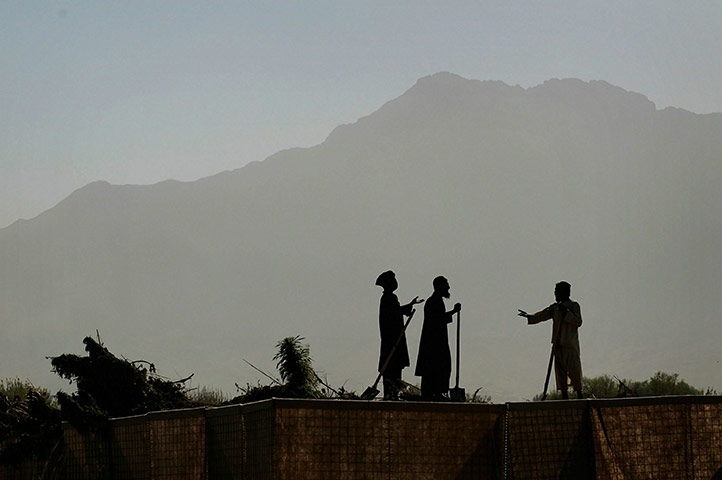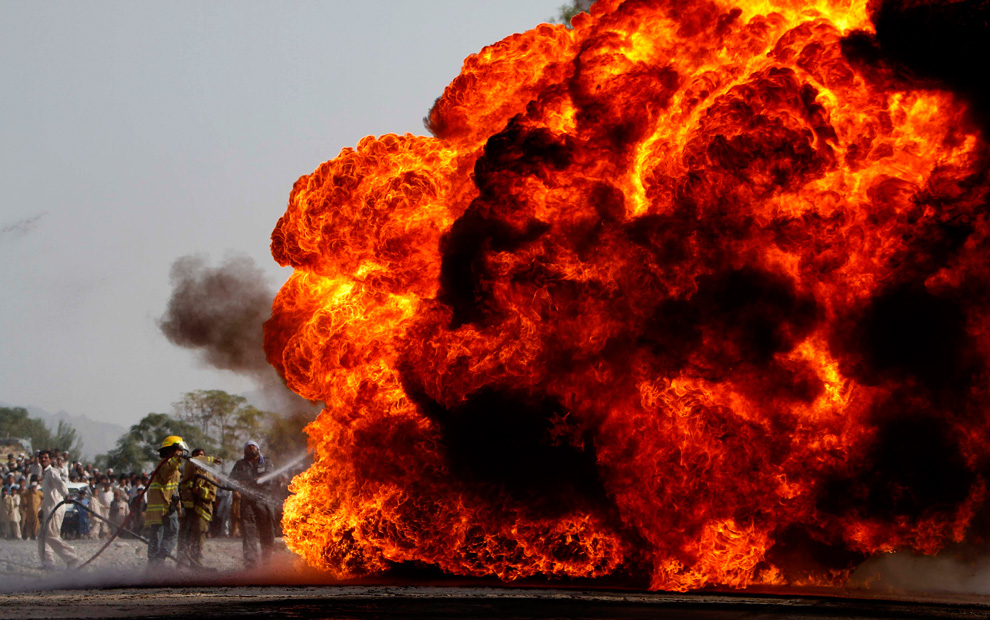What if you were to ask yourself what happened while you were asleep? A simple question, unless one doesn’t take it as a literal question–that is, regarding what happened during the night or while one was napping. It’s a different question if it pertains to dogmatic slumbers, chronic indifference, or collective amnesia. That kind of sleep can go on for a long, long time. And, of course, it can occur while you otherwise are fully awake. Awake, for example, but shrouded in myth.

This is a remarkable photograph, not least because it imparts such a sense of calm. Three laborers in Afghanistan have become transposed into profound elements of Chinese culture: the misted mountains that are the backdrop for so many paintings of natural beauty, and the three sages of Confucian philosophy who exemplified the virtuous conduct required for social harmony.
Against the pacific backdrop of the ancient mountain softened by fog, the three figures strike unaffected poses of disciplined conversation. One expounds, another offers a counterpoint, while the third listens reflectively. Each is self-composed, seemingly capable of serenely walking the earth without care or imposition, and yet they are joined by the intent concentration evident in their gestures. Whatever the whirl of events in the modern world, they seem to be safely ensconced in a time out of time where philosophical conversation and unhurried labor are all one needs to be content.
As it happens, the simple labor involved spreading dirt on an earthen barrier for a police station. We don’t know what they were discussing, but they definitely are caught up in the war. The photograph, which rightly reminds us that there is more to contemplate in Afghanistan than the war, also becomes a template for the mythic interpretation that I set out above. Stated otherwise, the photographer may have captured how some would like to think of Afghanistan: as a timeless place, graveyard of empires, that will endure unchanged regardless of the current occupation, and that can be conveniently put out of mind, forgotten, left to itself.
Well, that’s one country. And here’s another:

Not so calm. This enormous fireball is erupting from an oil tanker that was lit up by an IED. That kind of fire only comes from modern fuel, and so there is little question that this is a contemporary scene and that the war is front and center. Instead of the laborers (now known as firefighters) dominating the picture, they are smallish figures set off to the side, obviously dwarfed by the enormous force of the flames. The sense of time is hardly mythic, as it is clear that the fire will have a relatively predictable burnout, and that the hoses then will be rolled up, the crowd will disperse, and everyone will move on to whatever is going to happen next.
The firefighters appear skilled, properly equipped, and very much an extension of a modern system of command and control. Look closely, however, and you will see something more: note how closely they stand to the flames, and how unhurried they appear–even calm. They are exhibiting another kind of serenity: the confidence that comes from having done this job many times before. And so they have: tankers are being detonated constantly in Afghanistan, and the firefighters and other first responders there are becoming all too experienced in managing disaster.
And so there is something timeless about the second photograph after all. It’s a modern scene, but also a story of continuous repetition: of bombings that are occurring over and over and over again. And don’t tell me that the incidence of explosions has decreased in this or that province, or that new headway is being made in the effort to win the hearts and minds of the people. The fires are burning, and they will continue to burn.
What happened while you were sleeping? Nothing much, just the war.
Photographs by Chris Hondros/Getty Image and Rahmat Gul/Associated Press.
You and I were in sync this weekend, though I think my time scheme may be a little broader than yours. Details at
http://jonathan-morse.blogspot.com/2010/11/hatfirst.html
I must first start out by saying how magnificent and powerful these two photographs are, as well as, how true, and scary Rahmat’s translations suggest. The first photo exuded what Barthes would call punctum- which is to characterize the affective element of those certain photographs that are able to pierce one’s heart. This is exactly what happend to me when I first saw this photograph. My heart was pierced, for many reasons, first, the body language from the three men, it is clear that they were engaging in a constructive debate, most likely about their homeland, and the prolonged envasion that has been implemented within it. It is mind boggling for me to think about how the space, place, and time of this shot is so incredibly hard to fathom, living in San Diego county, the fast paced life and addiction too time seems to heighten every day. The constant repetition of cellular phones, and lack of face-to-face communication, I often feel trapped living here. This photo omits a certain freedom of space, thought, and brotherhood that is slowly being ripped away from their sacred section of the world. The type of freedom that vanished a long time ago in this supposed “land of the free”.?
The characters within the two photographs exhibit a certain sense of serenity despite the context in which they are representing and this serenity in the midst of war is unsettling. It is unsettling in the sense that these men are so accustomed to the effects of war that it appears that dealing with the realities of war is just a part of the daily routine, which is thought that I feel is very foreign to the average American. In the second photograph the photographer frames the picture in a way that makes the firefighters appear much smaller than the roaring fire and this framing causes this photograph to really complete the narrative of the blog.